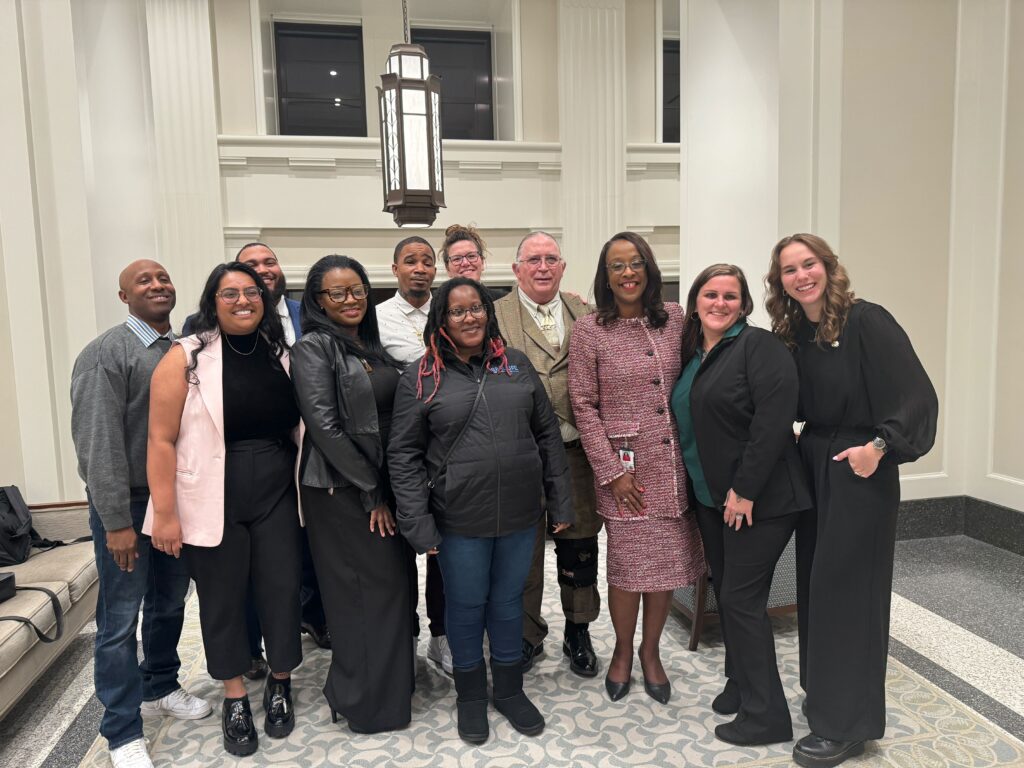July 25, 2024
Decriminalizing Poverty: What Happened in the 2024 Session and What Still Needs to be Done?
Justice should not depend on what someone looks like or how much they have in their wallet. Yet a number of laws currently on the books in the Code of Virginia can, in practice, overwhelmingly harm individuals with limited means in contrast to people who have access to a steady stream of income or resources. For example, if a person is found in violation of a traffic offense, like making an illegal U-Turn, a person with access to means would be able to pay that fine and chalk it up to a bad day. However, if a person without access to resources makes the same illegal U-Turn, they might need to enter into a payment plan to pay off the court fines and fees and, if it takes them more than 180 days to pay it off, the costs will start accruing interest. The punishment for committing the same crime is simply harsher based on an individual’s access to resources, further entrapping people in a cycle of poverty. As TCI monitors and interacts with the legislative session each year, we pay special attention to bills that might alleviate or worsen the criminalization of poverty. In the 2024 General Assembly Session, TCI worked alongside partners to alleviate the impacts of court debt on young people and on folks who have been working to pay off their court debt for decades.
Statute of Limitations for Delinquent Court Debt Collection
Like other states, Virginia has rules specifying the length of time that a lawsuit may be filed in court, including lawsuits that seek to collect outstanding debts. These rules are commonly referred to as statutes of limitations. A closer look at the statutes of limitations reveals why court debt specifically casts such a long shadow. For most kinds of debt, creditors have 10 years to enforce a court judgment and collect the debt, although the law does permit extensions under certain circumstances. But when it comes to court debt, the rules are much different and more harsh. The statute of limitations is 30 years for fines and fees imposed by a general district court and 60 years when the debt is imposed by a circuit court. Under such a scheme — one that locks many people into cycles of debt they cannot escape — the only winners are the debt collectors. For many people in Virginia, especially those least able to pay, it’s possible for court debt to follow them for the rest of their lives.
But such counterproductive laws are not inevitable. Several states across the country have already enacted model reforms that Virginia can learn from. For instance, in 2021, Illinois shortened the statute of limitations period for debts related to violations of laws and regulations at the local level. In 2022, Washington state passed legislation to strengthen protections for people with limited or no ability to pay court debt by limiting court debt collection enforcement to 10 years, and by allowing individuals to petition forgiveness for their court fines at any time. Furthermore, in places like Wisconsin and Mississippi, the right to collect outstanding debt is explicitly prohibited in the law once the statute of limitations expires.
During the 2024 legislative session, TCI worked on legislation that would reduce the statute of limitations for outstanding court debt to 10 years across the board. The General Assembly passed bills introduced by Delegate Hernandez and Senator Williams Graves, (HB857/SB514) with some bipartisan support. One change was made to ensure that in cases where the individual with court debt is incarcerated, the statute of limitations period would not begin until the intended date of release. In the Senate Courts of Justice Committee where the bill was originally heard, individuals with lived experience with court debt were able to share how having outstanding court debt has inhibited their ability to pay for normal life expenses, such as supporting a child through school. We are grateful for the bravery displayed by these community members and TCI’s continued partnership with REAL Life, an organization that provides resources, housing, and support groups for individuals exiting incarceration. It is critical that lawmakers hear from impacted individuals on how these bills would enhance their ability to meet their basic human needs.

Unfortunately, Gov. Youngkin ultimately vetoed the legislation. While we remain disappointed at this outcome, we are also heartened that the legislature was supportive of the measure. TCI will continue to push for this practical and meaningful change that would make sure people in Virginia are not trapped in a lifelong cycle of poverty.
Youth Fines and Fees
Virginia can be a place where every young person has the support and resources to reach their full potential and where young people who get into trouble are helped to get back on the right track. Unfortunately, currently in Virginia, the youth court system frequently imposes fines and fees on troubled young people and their families, placing additional barriers in their path. This creates long-standing harm for children who enter the system and their families, with Black teenagers disproportionately being swept into the youth criminal legal system and therefore facing the greatest financial and family harms.
In partnership with RISE for Youth and the Juvenile Law Center, TCI worked on legislation that would eliminate fines and fees for youth in criminal cases (HB1263/SB481) and would allow judges the discretion to charge fines and fees in youth traffic cases (HB1264). The goal of this legislation was to pivot to a more appropriate means for correcting youth behavior — charging a child with no access to resources of their own does little in the way of accountability. Simply put, Virginia’s children need to be allowed to be children — learning, playing, growing. Fines and fees have the potential to hamper rehabilitation, ask children to act as adults, and potentially strain family relationships as the adults who may or may not have access to income are the ones most likely to pay.
Moreover, fines and fees are, and always have been, inefficient sources of revenue for funding the court system. Overall fines and forfeitures are a relatively insignificant revenue source for Virginia’s local communities, typically making up less than 0.5% of county and city revenue. Localities rely even less on revenue generated through Juvenile and Domestic Relations (JDR) Courts as these fines and fees make up less than 2% of all fines and fees collected in the commonwealth. Further, most of the fines and fees assessed in JDR Court are never collected. In 2023, over $8 million of JDR court fines and fees were assessed – less than 40% of that amount was collected the same year. While fines and fees are doing very little for the court system, they are pushing many young people and their families further into poverty.
Unfortunately, the Senate Finance and Appropriations Committee delayed any further discussion of HB1263/SB481 (“continued the bill”) to 2025, and the governor vetoed HB1264. While there was concern over the legislation’s potential to bring a loss in revenue to the court system, we affirm that the percentage of youth fines and fees that are actually collected in these cases is negligible in the grand scheme of court funding. TCI, alongside our partners, will continue to fight to make sure that the legal system connects young people — no matter what they look like or how much money their family has — to the support and resources needed to reach their full potential, rather than placing additional barriers in their path.

Other Wins and “Almost Wins”
Beyond the world of court fines and fees, advocates attempted many other meaningful reforms this session. TCI supported several partner-driven initiatives, including the push from Legal Aid Justice Center (LAJC) to provide individuals with court fines and fees with an itemized receipt of their costs incurred (HB246). This support was grounded by listening sessions hosted by TCI and Virginia Community Voice in 2023 to hear from individuals who have lived experience with court debt. In these sessions, a primary theme stood out — people working to pay off their expenses simply had no idea how much money they owed to the court system, let alone why they were being charged for various, seemingly random, fees. Without this information, folks expressed a feeling of “throwing cash into the wind,” never really knowing if it was making a difference toward their overall balance. While the Senate passed the bill unanimously, and the House passed the bill with bipartisan support, Gov. Youngkin also vetoed this bill.
Additionally, LAJC worked on legislation this session that would have limited the fee charged to people who have been appointed counsel due to inability to afford their own (HB824). Currently in Virginia, when a person cannot afford to pay for an attorney and is assigned one by the court, that representation isn’t free if the person is convicted, accepts a plea bargain, and even sometimes when a case may be dismissed. Instead, they get charged a court-appointed attorney fee (for their court-appointed attorney or public defender), despite the judge already having decided that they do not have the means to pay for an attorney. HB824 would have prevented counsel fees from being assessed against a person who was determined unable to pay for an attorney, effectively removing this requirement to pay for counsel they cannot afford. While the bill passed the legislature along party lines, the governor vetoed it.
Lastly, lawmakers considered legislation this session to raise the limitation on fees court-appointed counsel may receive for their work (HB102/SB356). While the raise for public defenders and court-appointed counsel is long overdue, there was fear from like-minded advocates that this increase in fees would then be passed along to people who could not afford the attorney in the first place. A compromise was reached that capped the cost passed along to people who were appointed counsel at the rate they were charged prior to the legislation passing. The governor signed the bill into law on April 8, 2024.
Next Steps
While advocates made great progress this session in the way of communicating various issues individuals are experiencing related to court debt, roadblocks remained as far as getting these policies signed into law. Throughout the summer, TCI will continue to work with community members and leaders to develop and implement strategies to make further progress in these areas and to learn about other barriers and solutions that we can support in the 2025 session. Bolstered by community expertise, TCI will continue to fight for the decriminalization of poverty in all facets of the criminal legal system so that justice does not depend on one’s wealth.
Categories:
Budget & Revenue, Decriminalizing Poverty
